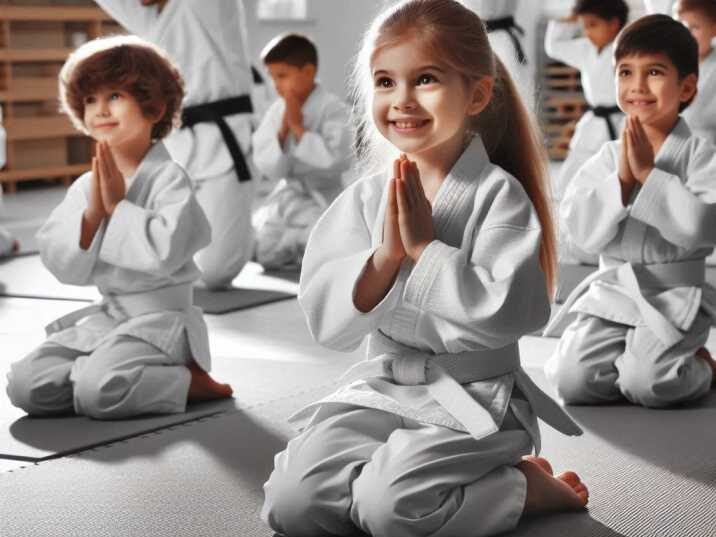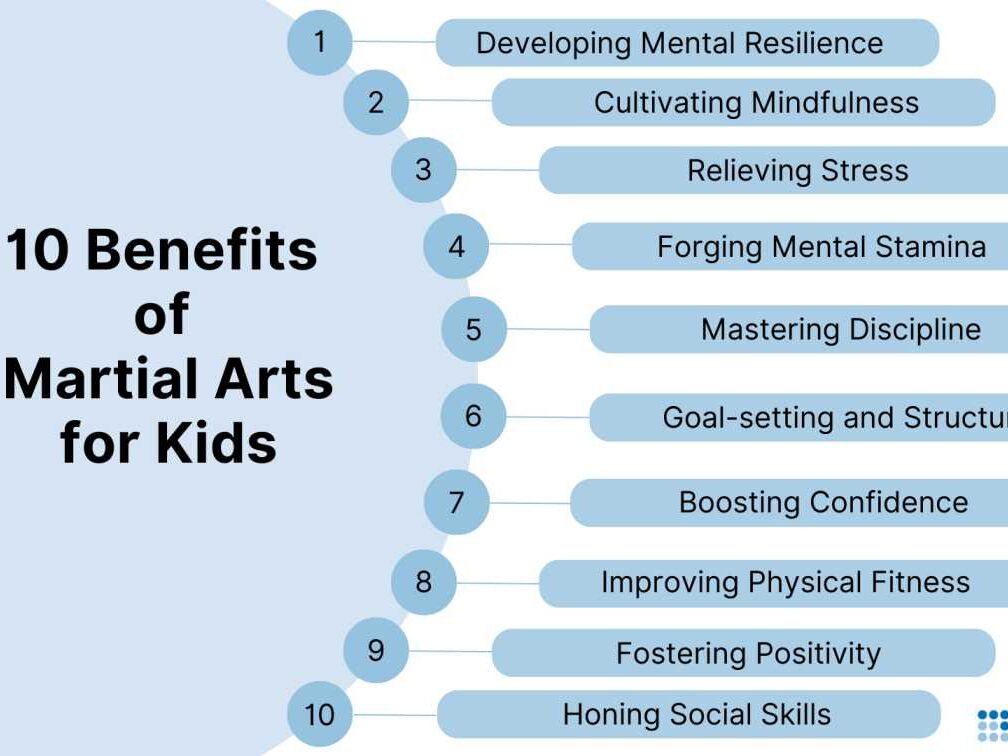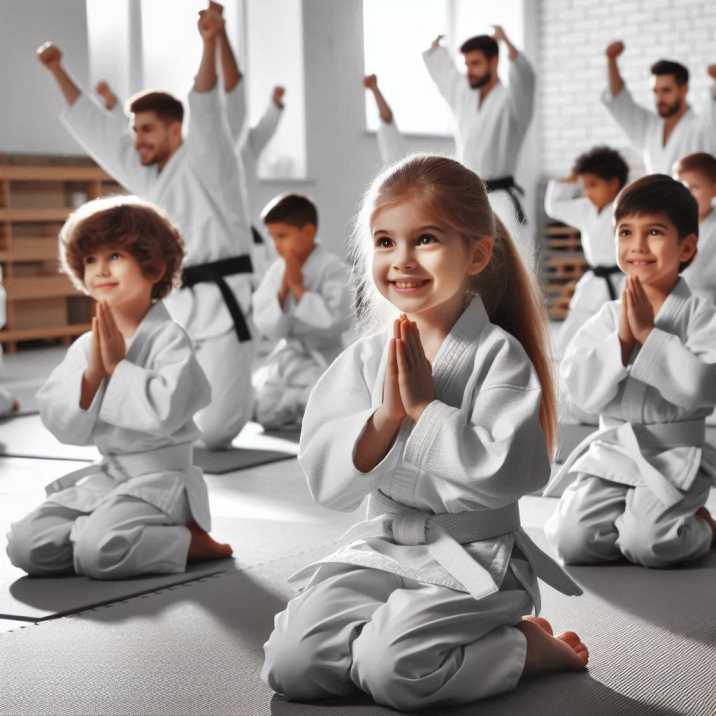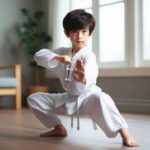Martial arts are not just about punches, kicks, or winning fights. They also help build a strong and healthy mind. Whether you’re practicing karate, taekwondo, judo, or Brazilian jiu-jitsu, martial arts can make you feel more focused, confident, and calm. This article explores the amazing mental benefits of martial arts that help children and adults become better at school, at home, and in life.

Introduction: A Workout for Your Brain, Too!
Table of Contents
When you think of martial arts, you might picture people in uniforms doing cool moves. But did you know martial arts also train your mind, not just your body? Many students who practice martial arts do better in school and feel happier. Why? Because training requires concentration and discipline, which can translate to improved focus in school and other activities. This article explains how martial arts help your brain grow stronger every day.
Improved Focus and Concentration
What is Focus?
Focus means paying attention to one thing at a time. In martial arts, you must watch your teacher closely and remember each move. If your mind wanders, you might miss something important.
How Martial Arts Improves Focus
Kids must listen carefully to instructions
In martial arts class, children have to listen closely to their instructors to learn each movement step-by-step. Whether it’s how to punch correctly or how to perform a kata (form), paying attention is key. If they don’t listen carefully, they might miss an important part of the move or safety rule. This builds the habit of being present and alert. Over time, kids develop sharper listening skills that help in school and everyday life.
They practice moves many times to get them right
Repetition is a big part of martial arts training. Students must repeat punches, kicks, and blocks until their bodies remember them without thinking. This process of doing the same task again and again helps develop mental focus and patience. It also teaches them that improvement takes time and effort. This builds stronger brain pathways for concentration and memory.
This helps train their brain to stay on task in class or when doing homework
The mental discipline built during martial arts practice helps kids stay focused on single tasks for longer periods. Just like they focus on completing a form without getting distracted, they start applying the same focus while reading or solving math problems. They learn how to avoid distractions and stay organized. This mental muscle, once trained, supports better performance in school.
Finish their schoolwork without distractions
Children who do martial arts training tend to be more aware of how to block out distractions—like noise, phones, or wandering thoughts. The focus they use in the dojo (martial arts school) carries over to their study habits. They become quicker at completing homework because they are more disciplined and goal-oriented. This reduces stress and leaves more time for play or rest.
Follow directions from teachers and parents
Martial arts martial art training teach kids to listen, respect authority, and follow instructions without arguing. In class, they learn to respond quickly to commands like “block” or “bow.” At home and school, this habit helps them follow rules and directions the first time they’re asked. This improves relationships with parents, teachers, and other adults in their lives.
Stay calm in noisy or busy environments
Through breathing exercises, mindfulness, and structured routines, martial arts help children learn how to remain calm under pressure. Even when the classroom is loud or the playground is chaotic, martial arts-trained kids know how to breathe deeply, stay centered, and focus on what’s important. This skill helps reduce anxiety and keeps their minds clear and sharp.
Boosts Confidence and Self-Esteem
What is Confidence?
Confidence means believing in yourself and your abilities. Martial arts martial art training helps kids feel proud when they learn new skills or earn a new belt.
How Martial Arts Training Builds Confidence
- Kids learn to break boards, spar safely, and improve their moves.
- Each small success builds big confidence.
- They learn to speak clearly, make eye contact, and stand tall.
Real-Life Benefit
Kids with more confidence are more likely to:
- Raise their hand in class
- Make new friends
- Try new activities without fear
Teaches Self-Discipline and Patience
Why Discipline is Important
Self-discipline is the ability to make good choices, even when it’s hard. In martial arts, students must follow the rules and practice regularly—even when they don’t feel like it.
How Martial Arts Teaches Discipline
- Students bow to their teacher and classmates
- They wait their turn and follow dojo rules
- They learn to set goals and work hard over time
How This Helps in Daily Life
- Kids become more responsible with chores and schoolwork
- They stay calmer when things don’t go their way
- They avoid getting in trouble at school or home
Reduces Stress and Anxiety
How Martial Arts Calms the Mind
Even young kids feel stress—from homework, tests, or arguments. Martial arts helps release that stress in a healthy way.
Deep breathing during warm-ups and cool-downs helps relax the body
At the start and end of every martial arts training, kids often do deep breathing exercises. This helps slow down their heart rate and calms their nerves. Taking slow, deep breaths sends a message to the brain that it’s time to relax. Over time, kids learn to use this skill anytime they feel stressed. It teaches them how to stay calm in tough situations, even outside of class.
Hitting pads or practicing moves releases built-up energ
Kids have a lot of energy, especially after sitting in school all day. Martial arts gives them a safe way to let out that energy by kicking, punching, and moving around. Hitting pads or doing fast drills makes their bodies feel better and their minds more focused. Instead of getting in trouble for being too active, they learn to channel their energy in a healthy way. This can lead to fewer outbursts at home or school.
Fun group classes create a happy and safe space
Martial arts classes are fun and filled with friendly classmates. Instructors encourage kindness and teamwork, so kids feel safe and included. This positive space helps children open up, try new things, and enjoy being part of a group. When kids feel supported, they’re more likely to stay motivated and keep coming back. A happy class environment boosts their mood and self-esteem.
Kids feel more peaceful and less angry
Martial arts teaches children how to stay calm, even when something upsets them. They learn that fighting is not the answer—self-control is. By practicing moves and breathing techniques, they release their anger in a safe way. Many kids say they feel lighter and more relaxed after class. This helps them respond better to challenges at home or school.
They learn to manage big feelings without shouting or crying
When kids face big emotions like frustration or sadness, martial arts martial art training gives them tools to stay in control. Instead of yelling, crying, or acting out, they use deep breathing and focus to handle how they feel. They also learn that it’s okay to ask for help and talk about their emotions. This emotional strength helps them grow into confident and kind individuals.
They sleep better at night
After a full martial arts class, kids’ bodies are tired in a good way. Their muscles have worked hard, and their minds are more relaxed. Because of this, they fall asleep faster and sleep more deeply. Better sleep means they wake up feeling refreshed, ready to focus in school, and in a better mood throughout the day.
Builds Emotional Resilience
What is Emotional Resilience?
Emotional resilience is your ability to bounce back after something hard. Martial arts teaches kids not to give up when they lose a match or forget a move.
How Kids Grow Stronger Emotionally
- Mistakes become learning moments, not failures
- Supportive teachers and teammates encourage each other
- Each challenge helps build a stronger mindset
Encourages Goal Setting and Achievement
Setting Goals in Martial Arts
In every martial art training, students work toward earning new belts or mastering new forms.
How Goal Setting Builds Success
- Teaches children to break big goals into smaller steps
- Rewards effort and progress, not just perfection
- Builds habits that help in school and future careers

Promotes Respect and Better Behavior
Why Respect Matters
Martial arts begins and ends with respect—for yourself, your teachers, and your peers.
How Martial Arts Instills Respect
- Students bow before and after class
- They learn to control their voice and actions
- They treat others kindly, even in competition
Table of Mental Benefits of Martial Arts
| Mental Benefit | How It Helps |
|---|---|
| Improved Focus | Helps kids pay attention in class and complete tasks faster |
| Boosted Confidence | Makes students believe in themselves |
| Self-Discipline | Encourages self-control and responsibility |
| Stress Relief | Reduces anxiety and helps with emotional control |
| Emotional Resilience | Builds strength to handle failure and bounce back |
| Goal Setting | Teaches kids to set and reach goals step by step |
| Better Behavior | Improves manners and respect toward others |

Conclusion: A Strong Mind Starts with Martial Arts
Martial arts do much more than teach punches and kicks. They help kids develop a strong mind, filled with focus, confidence, and emotional strength. Whether you’re looking to improve in school, feel calmer, or become more responsible, martial arts is a fun and powerful way to grow.
It’s not just a sport—it’s a life skill. So put on that uniform, tie your belt, and take the first step toward a better you!
FAQs: Mental Benefits of Martial Arts
1. Can martial arts help kids do better in school?
Yes! Martial arts improves focus and self-discipline, which helps students learn better and finish their schoolwork on time.
2. Does martial arts help with stress?
Absolutely. Practicing martial arts helps release energy and teaches calming breathing techniques that reduce stress.
3. Is martial arts only for physical strength?
No. Martial arts builds mental strength, emotional control, and confidence too.
4. What if my child is shy?
Martial arts helps shy kids build confidence and feel more comfortable in group settings.
5. How often should kids practice to see mental benefits?
Practicing 2–3 times per week is enough for most kids to start noticing improvements in focus and behavior.



